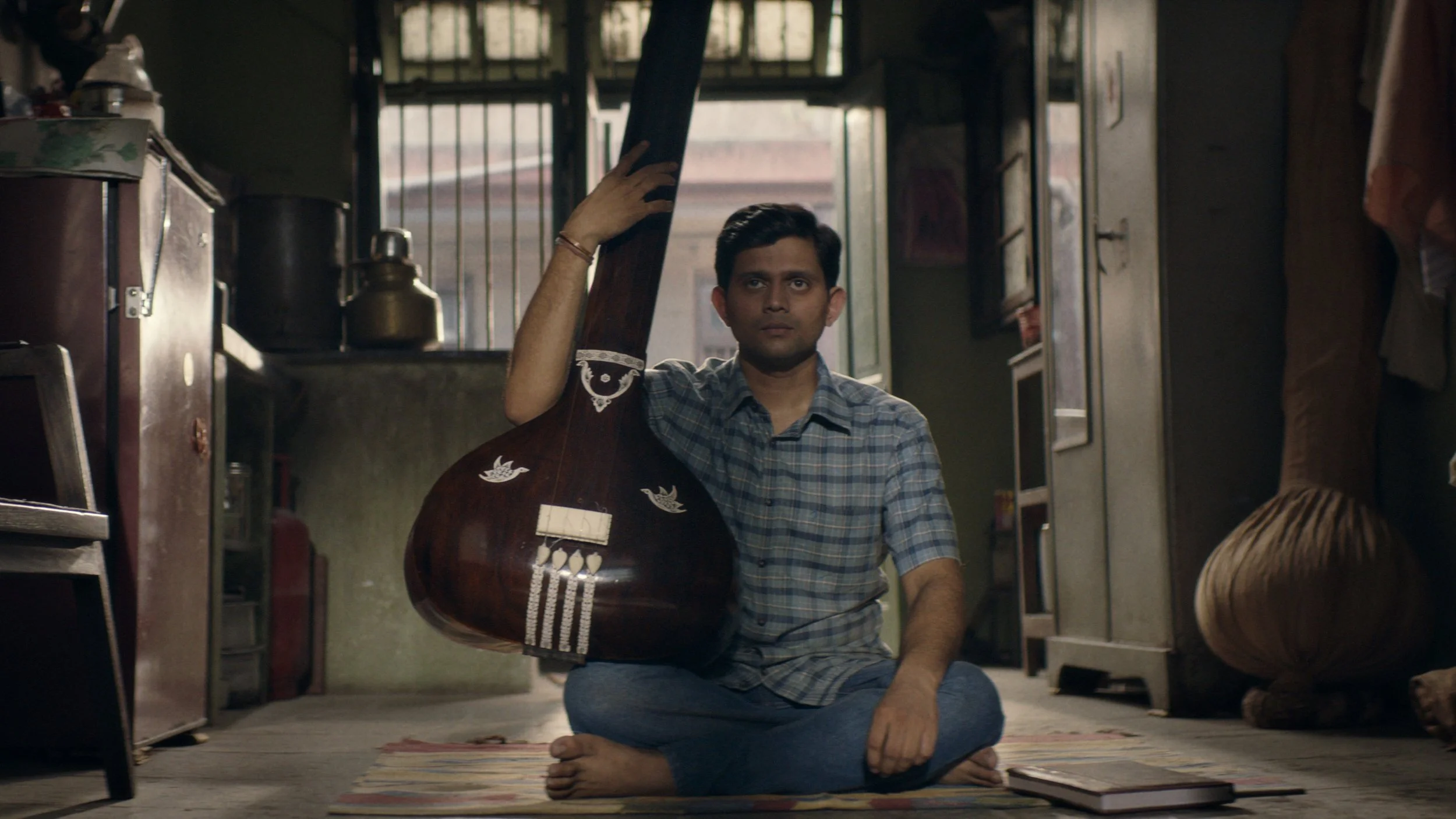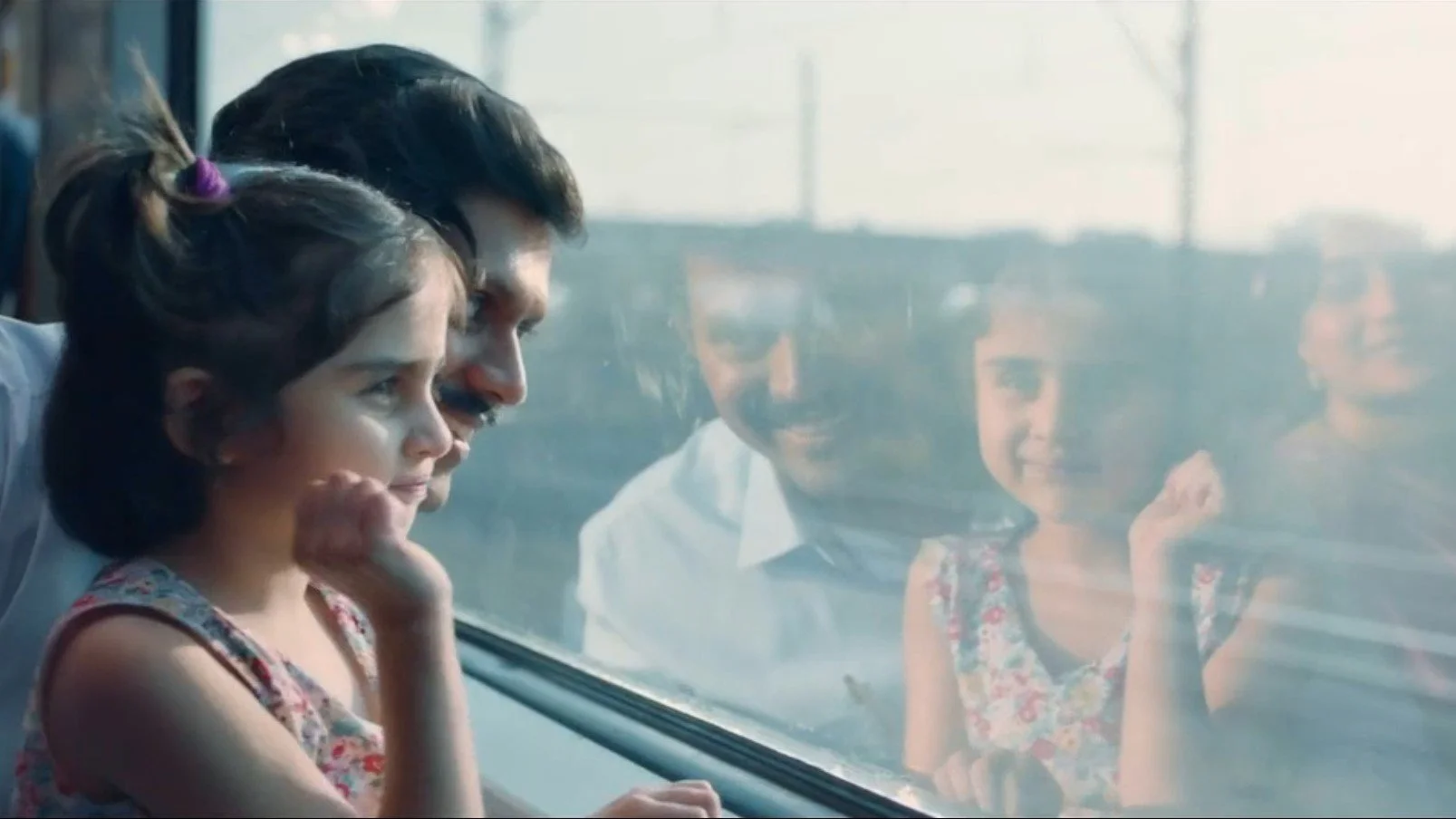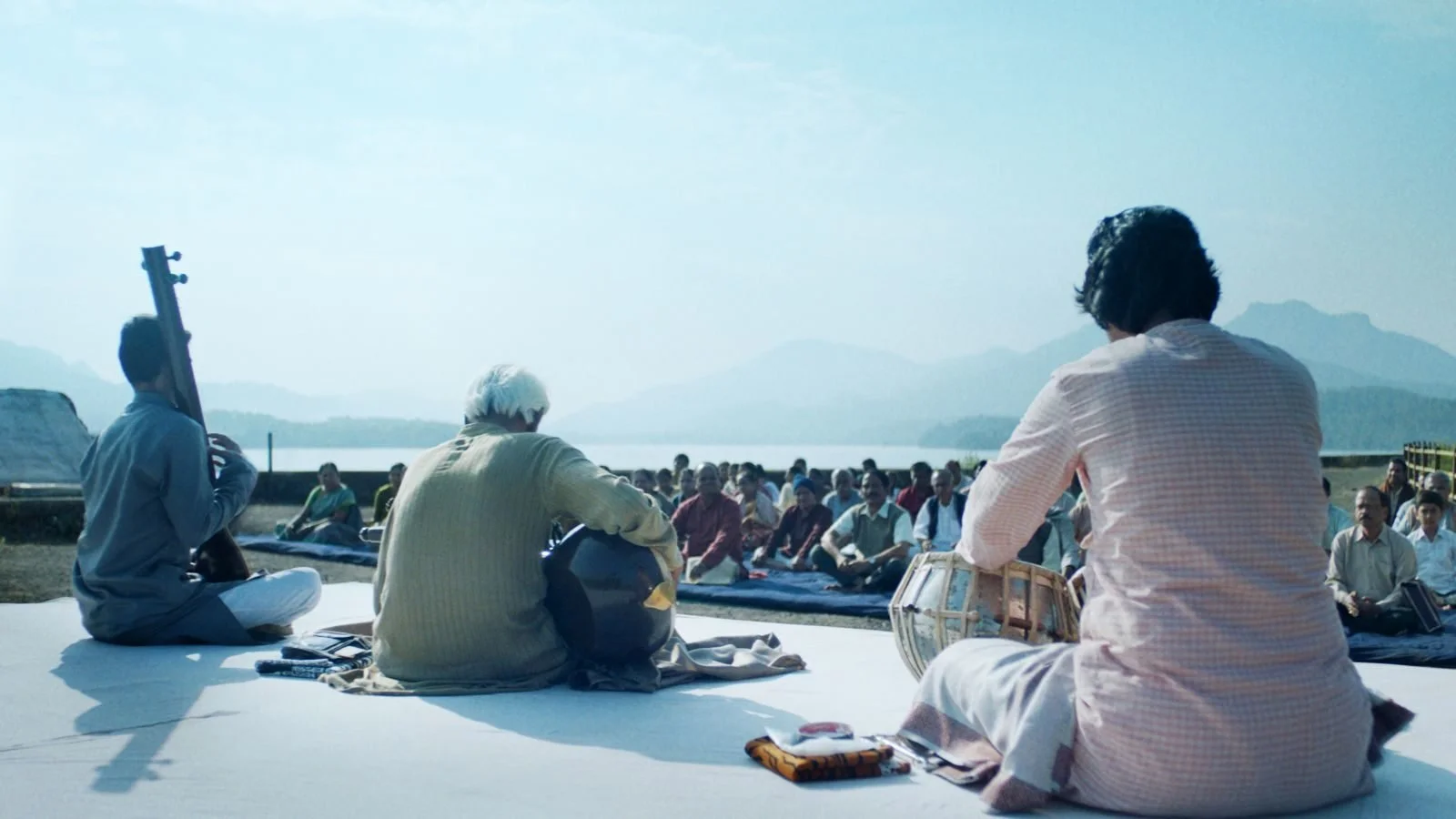the disciple (2020) film review | analysis of a struggling artist
my review/analysis of The Disciple (2020) — a film about the journey of an Indian classical vocalist — as a portrait and guide for how NOT to be a struggling artist.
*
watched: July 2023, Netflix
rating: 6/10 — watch only if you’re super curious.
mood: realistic, naturalistic, artsy (but not necessarily in a good way?), voyeuristic, slow, existentially heavy (and maybe a bit wrought), low-key depressing
to be honest, I found this film painful to watch. maybe it’s that 2 hours of watching another artist’s struggles, insecurities, and internal agonies played out in voyeuristically slow pacing — made me feel helpless inside (and a little frustrated/bored). or, it’s that the chronological jumps decades into the future — to see the “outcome” of his years of striving — that is: that palpable taste of bitterness and envy, that compromising/settling into his middle age, and even the fact that he had a family — it left an aftertaste of, well, bittersweet (70% bitter, 30% sweet) disappointment — with a small touch of relief. (thank god, someone loves him!)
this film touched a lurking, sore anxiety at the back of every artists’ mind (I venture to generalize) — certainly in mine, that is: the fear that when all is said and done, reality will inevitably disappoint. reality (a.k.a. “the world outside of our artists’ tunnel vision world”) is like an indifferent monster, catching up with our dreams and ambitions, proving us futile, not-enough, and possibly very foolish. reality is the voice of futility — the fear which asks:
‘what if — no matter what I do,
no matter how hard I try,
I’ll never be “good enough”
as an artist to be
“successful”?’
spoiler to my review: I think this whole question is wrong, and this film, for me, personally, is a lesson in how NOT to be a struggling artist.
first, let me preface this with some background:
what this film is about
this movie is about Sharad, a young classical singer of the Hindustani tradition — and a devoted disciple of Guruji, his elderly guru/master/teacher — in his years and decades of struggling as a performer. the film itself is a wonderful, incantatory introduction to an old musical and cultural tradition (I’ve listened to indian ragas before, but never with such attentiveness and slowness that this movie invites) — but these broader themes aren’t what I’m here to dissect today.
for more background context, check out this video summary, this article from national herald of india, and this one by the new yorker.
a journey from passion to disappointment
the story in this movie is probably what my parents imagine when they think of the “artists’ life” — always striving for recognition, in poverty, and too stubborn to change (until middle age, when they eventually give up, or “sell out.”)
so much of what Sharad goes through feels incredibly, incredibly relatable — this intense youthful passion and devotion to his craft, the looming insecurities and feelings of not-enoughness, the existential questioning, the political/networking striving, the feeling of financial stress, sacrifice, surrender, the loneliness and feelings of being misunderstood, the self-comparison on social media, the envy, the feelings of futility, the blanket of bitterness, and ultimately… the resignation.
towards the end, he’s in his late thirties, and he gives up on his performing career in a dramatic way — walking off stage, mid-performance. fast forward to some years later, and you see that he has a wife and daughter, dressed in a crisp white shirt, and is the founder of an audio company. they sit there on the subway, while a busker sings a song. he’s silent. we’re watching the whole thing from a distance, as we have throughout the entire film — as an audience of voyeurs.
you could say that the film ends in a note of bitterness, disillusionment, and loss. or, you could say that the film ends with a sense of acceptance and compromise, or an unfortunate reckoning with reality - “hey, you need to support a family, so stop being foolishly delusioned that you’re good enough to make it.”
but, while the enemy/main antagonist in this film seems to be “ARTIST vs. REALITY” as in: “he’s not good enough, so he should recognize that, and just stop,” or even “ARTIST vs. COMMERCIALISM,” but I’d argue - actually, this film is about “ARTIST vs. TRADITION,” and “ARTIST vs. SELF.”
artist vs. tradition: the bondage of loyalty
I read that the disciple-guru relationship portraited is that of the guru-shishya tradition. the film starts by showing this relationship with his Guruji with a level of honor and reverence — but, over the course of the film, I think, it gradually questions, and wears it down.
towards the end of the film, Sharad’s conversation with the music critic — who, essentially, bashes his idols — feels like the film’s way of dismantling this system, via an outsider’s perspective.
you could call Sharad’s relationship with Guruji a monklike, ascetic's devotion — or a form of creative/artistic bondage. to be tied to one tradition, one teacher, one undying kind of artistic loyalty, for life? from my own cultureless, anarchist, agnostic perspective, I think I would go crazy. for me, this kind of loyalty feels incredibly limiting.
Sharard’s Guruji — who he takes care of, massages with ointment — is generally unrecognized (“unsung” genius) in his own right, and, at old age, struggling to pay his own medical bills. is this the best possible outcome that our protagonist, who is seemingly far less talented, can even hope for? towards the end, even Maai — a mythical singer / teacher whose lecture audio tapes Sharad plays, a voiceover on his nighttime bike roads — is shown in bigger context at the university archive center. Sharad worships her as an idol, but even she is ultimately unknown, unheard of, unrecognized. what does that mean — when he finds out that his heros are nobodies? (why does that even matter, so much?)
my question is: to what extent do these forms of fanatic loyalty and reverence serve him, or support him as an artist — and to what extent is it just keeping him in a fanatical, almost religious sort of artistic imprisonment? does he even have a choice?
artist vs. self: dependency on validation
for me, the greatest blockage that I see in Sharad’s relationship to himself as an artist — and perhaps, perpetuated by the system — is his reliance and emotional dependency upon external recognition/validation. the film has an incredibly naturalistic way of building up his frustrations, his responses to even the smallest of slights — they accumulate into a portrait of intense insecurity and emotional fragility.
what I’m talking about is his need for an audience’s applause, a teacher’s praise, a reward — a show — and his inability to measure up, his anger at himself, his inability to not compare, his bitterness — which, over the course of years, eventually builds up and expresses itself as egotistical, self-righteous power. when he’s a schoolteacher, he insults one of his students who came with his mother to ask for his blessing before participating in a college fusion band. “ok you can go, but don’t come back,” he says — like a childish tyrant.
just because HE feels unrecognized, unsuccessful, and unacknowledged by his tradition — he attempts to exert his own limited power over his students. whereas before, I found him a sympathetic character, in this instance I found it incredibly distasteful and pathetic; a perfect example of toxic patriarchy fueled by male fragility.
instead, we watch him over his shoulder, scrolling Facebook, Youtube, click by click — so slowly it feels like voyeuristic masochism — we watch his eyes scrolling through the successes of his peers, reading the negative comments on his videos, and responding — with self-righteous, holier-than-thou attack — as in, I doubt you’d ever understand the complexity of this music — which means, look how esteemed I am to be of this difficult tradition.
clearly, his own lack of fulfillment and insecurity turns into outright defensiveness/combativeness. to me, it highlights the ways in which, no matter how much talent you’re born with or without — this cycle of comparison and low self-worth will always be a cage, keeping you from artistic growth, or any sort of creative fulfillment.
instead, we watch him masturbate & meditate — like an unending cycle of frustration with no release, no where to go. I found this masturbation / meditation interjections odd — and embarrasingly… human?
an artist’s lack of inner fulfillment
in a system suffocated by hierarchies, tradition, dichomaties (classical music vs. commercialized talent shows) — our protagonist, at the end of the day, has very little to show for the fruits of his labor. nothing, barely, in terms of audience response, accolades, or recognition. should he — really — even continue? is it foolish to keep playing music, if he has made “nothing of himself,” in the end?
wait wait, but isn’t this the opposite of what the holy guru Maai speaks of — in her lectures? that this tradition is about true, spiritual surrender — that you must accept the path of hunger and loneliness and sacrifice, in search of truth? truth is not about making something of yourself. truth is about being.
in other words — isn’t inner, spiritual fulfillment both the end goal, and the essential ingredient — to the pursuit of art? it is inner fulfillment, not validation — that fuels the work. you cannot get inner fulfillment from the outside world; neither from gurus, peers, audiences, nor judges, and awards ceremonies.
our protagonist was so psychologically weighed down by external worldly wants and needs — to be liked, to be accepted, to be famous, to be recognized — that no matter what he did, he was never able to attain that fulfillment, or any form of spiritual clarity — and this created a negatively reinforcing cycle. it limited and harmed him as an artist. he was never able to improve, to take criticism lightly, to discover his own relationship to his art, nor to the divine wisdom.
ending notes — on dismantling the system
I see how Sharad is limited by the traditions, systems, and circumstances — but as a story; one allegory of a “struggling artist” — this film captured the polar opposite of what I value and stand for.
this old model of thinking says: to be successful as an artist is a very rare thing — requiring extraordinary circumstances, talent, and that the outer world bestow that golden crown upon us.
this model of the world puts us forever in search of permission, validation, recognition — in order to make art-making a worthwhile pursuit.
personally, I say — fuck that. make your own golden crown. don’t wait to be seen. cultivate your own relationship to art. the essence of YOUR art, which is your relationship to creation; to creative divine spirit — is a relationship independent of all teachers, audiences, or judges. you don’t need anyone’s go ahead to find that inner spiritual and creative fulfillment.
to conclude, I’ll return to address this central anxiety that the movie triggers —
‘what if, no matter what I do,
no matter how hard I try,
I’ll never be “good enough”
as an artist to be
“successful”?’
I believe that “good enough” and “successful” are both vague, blanket-statement terms that mean nothing — until you pin down exactly by what metrics you’re measuring: good enough and successful. is it money? awards? fame? acceptance by a community or social group? is it to desire to be remembered by history, to leave a legacy? all these things are worldly things — that ultimately, have nothing to do with the pleasure, fulfillment, and spiritual transcendence that can come with the process of art.
and in that place, immersed in the process, no matter how “good” or “bad” you are; you’ll feel that art is for you. you will never abandon it. and it will never abandon you.





